Indians are much more likely to view their country’s religious diversity as an asset than as a liability. About half of Indians (53%) say religious diversity benefits the country, while 24% say it is harmful. The remainder (24%) don’t take a position either way.
At the same time, Indians of different religious backgrounds don’t see much in common with each other. For example, most Muslims say members of their religious community are very different from Hindus or Sikhs, and vice versa – most Hindus and Sikhs see themselves as very different from Muslims. With few exceptions, India’s major religious groups perceive more differences than similarities between their communities.
By their own admission, Indians also don’t know much about religions other than their own. While many Muslims, Christians, Sikhs, Jains and Buddhists say they know at least something about the Hindu religion, fewer Hindus claim any knowledge about India’s minority religions – even those, like Jainism or Sikhism, with some theological similarities to Hinduism.
India’s religiously diverse population is, therefore, composed of religious communities who are not too familiar with each other’s beliefs and practices, and who don’t see much common ground among them. Yet, many Indians take a pluralistic, rather than exclusivist, attitude toward religious beliefs. The predominant opinion among Indian adults overall, as well as within most of the country’s major religious groups, is that “many religions can be true,” rather than that theirs is “the one true religion.”
Many Indians also practice religion in a pluralistic way. For example, a substantial minority of Muslims, especially in some regions of the country, say they celebrate the festivals of Diwali and Holi, which are more commonly celebrated by Hindus, Sikhs, Buddhists and Jains. Many Christians also say they celebrate Diwali and Holi, while some Hindus celebrate Christmas. In addition, some members of India’s religious minority groups say they have prayed, meditated or performed a ritual at a Hindu temple. And, for their part, one-in-five Hindus in the North say they have worshipped at a gurdwara (a Sikh house of worship), and some in the South say they have prayed at a church. (See Chapter 7 and Chapter 11 for additional analyses of shared beliefs and practices across religious groups.)
More Indians say religious diversity benefits their country than say it is harmful
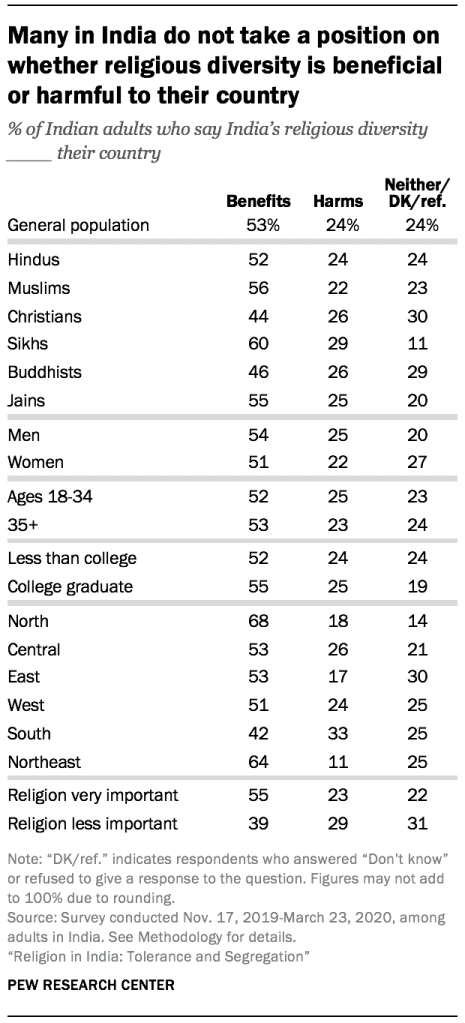
Home to more than nine-in-ten of the world’s Hindus, India also has one of the largest Muslim populations in the world, as well as millions of Sikhs, Jains, Buddhists and Christians.
Indians tend to see this religious diversity as benefiting their country. Roughly half say diversity benefits India (53%), while about one-quarter say diversity harms the country (24%). Generally, Indians of different ages, educational backgrounds and regions of residence tend to agree that diversity benefits the country.
However, a sizable minority (24%) does not take a clear position on the question, saying that diversity “neither benefits nor harms the country,” that they don’t know, or declining to answer the question.
Majorities of Sikhs (60%), Muslims (56%) and Jains (55%) say religious diversity benefits India. Meanwhile, fewer than half of Buddhists (46%) and Christians (44%) take this position; about three-in-ten in both groups do not provide a clear answer either way.
The most religious Indians – that is, those who say religion is very important to their lives – are more likely than those who are less religious to say religious diversity is beneficial to the country (55% vs. 39%).
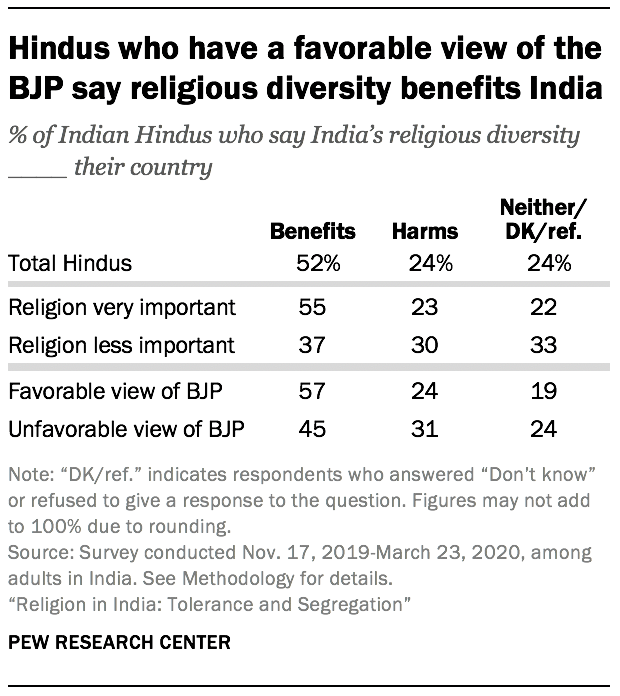
This difference between more and less religious people is largest among Hindus. Among Hindus who say religion is very important in their lives, most feel that diversity benefits the country (55%). But Hindus who say religion is less important in their lives are more evenly divided in their opinions: 37% say diversity benefits the country, 30% say diversity harms the country, and 33% don’t take a position either way.
Among Hindus, a majority of those who have a favorable opinion of the ruling Bharatiya Janata Party (BJP) say religious diversity benefits the country (57%), compared with 45% among those who have an unfavorable opinion of the BJP.
Within the Indian population as a whole, attitudes about religious diversity also vary by region: Majorities in the North (68%) and Northeast (64%) think diversity benefits the country. The South is somewhat less positive: Southerners generally are less likely than those in other regions to say diversity benefits the country.
Hindus in the South are relatively unenthusiastic about the benefits of religious diversity: 42% say diversity benefits the country. And while roughly half of Southern Muslims (48%) say India’s diversity helps the country, in the North (68%) and Northeast (75%), higher shares of Muslims see India’s religious diversity as an asset.
Most Buddhists, Muslims and Christians see members of their own religion as very different from Hindus
Even though Indians tend to value their country’s religious diversity, India’s religious communities generally don’t see much in common with one another. Across religious groups, large shares say that, based on what they know, members of their religious group are “very different” from followers of other religions. In fact, only 36% of all Indian adults say their group has “a lot in common” with even one of the five other major groups mentioned in the survey; the remainder (64%) either say they are very different from, or do not give a definite answer about, all five other groups.
For example, majorities among Indian Buddhists (67%), Muslims (64%) and Christians (58%) say they are very different from Hindus. Jains and Sikhs, on the other hand, tend to take the view that they have a lot in common with Hindus – 66% of Jains and 52% of Sikhs say this, the only two cases in which majorities or pluralities of one group say they have “a lot” in common with another group.
Most people in India’s non-Muslim religious groups don’t see much in common between the Muslim community and their own. Most Hindus (66%) say their group is very different from Muslims, as do nearly nine-in-ten Buddhists (88%). Sikhs are the most likely to say they have a lot in common with Muslims – 36% of Sikhs say this. Still, the majority view among Sikhs is that they are very different from Muslims (55%).
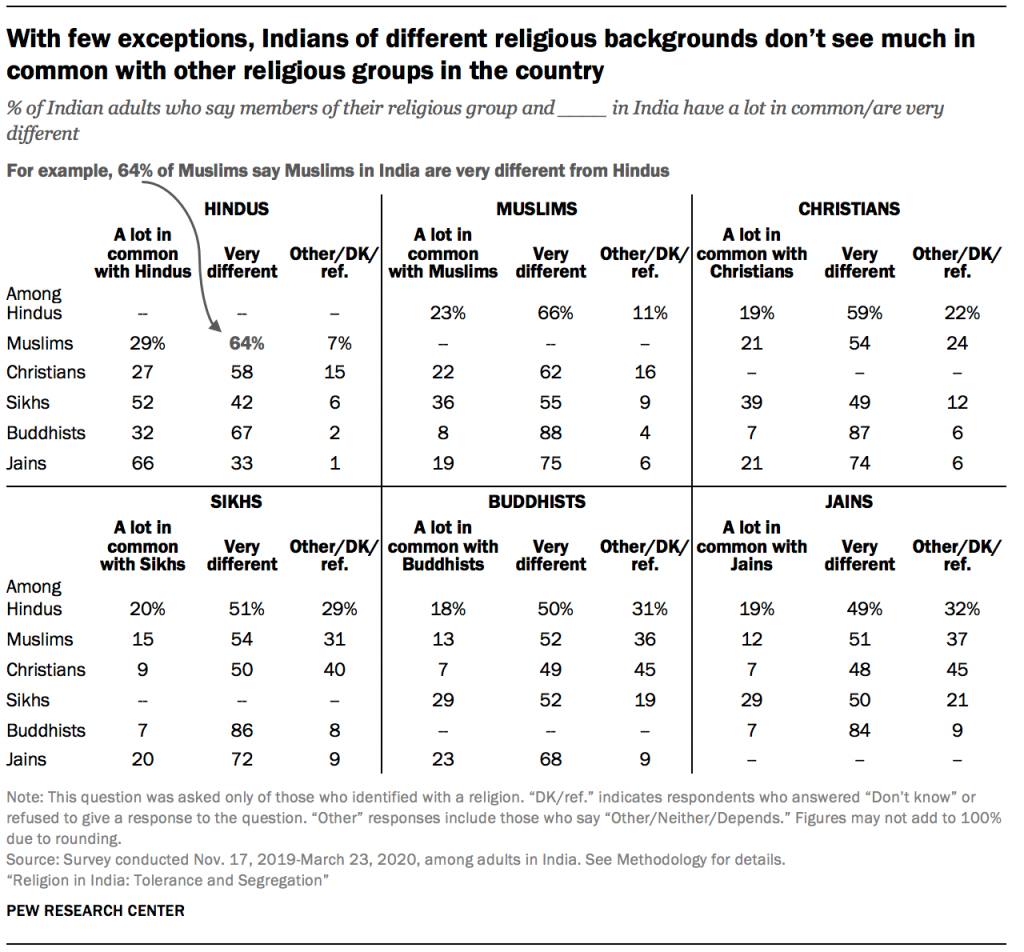
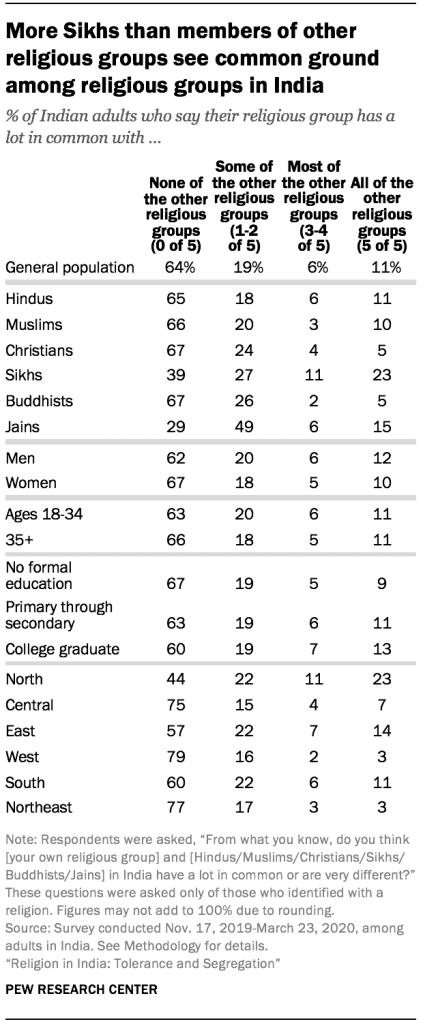
Generally, Sikhs are more inclined than others to say they have a lot in common with all groups asked about in the survey. Nearly a quarter of Sikhs (23%) say they have a lot in common with all other religious groups, compared with just 11% of Hindus who see common ground with all five groups.
While many Sikhs see common ground with other groups, members of those groups generally are less likely to say they have a lot in common with Sikhs. For instance, 52% of Sikhs say they have a lot in common with Hindus, while just 20% of Hindus say the same about Sikhs. Members of some of these groups may be less familiar with the relatively small Sikh population that is also concentrated in the state of Punjab; about three-in-ten Hindus and Muslims and four-in-ten Christians say they “don’t know” or otherwise decline to answer the question about how much they have in common with Sikhs.
People in the North of India are more likely than those in other regions to say their religious group has a lot in common with other groups. This pattern holds true across multiple religious groups. People in the Western, Central and Northeastern regions, meanwhile, generally are less likely to see commonalities among religious groups.
Indians are highly knowledgeable about their own religion, less so about other religions
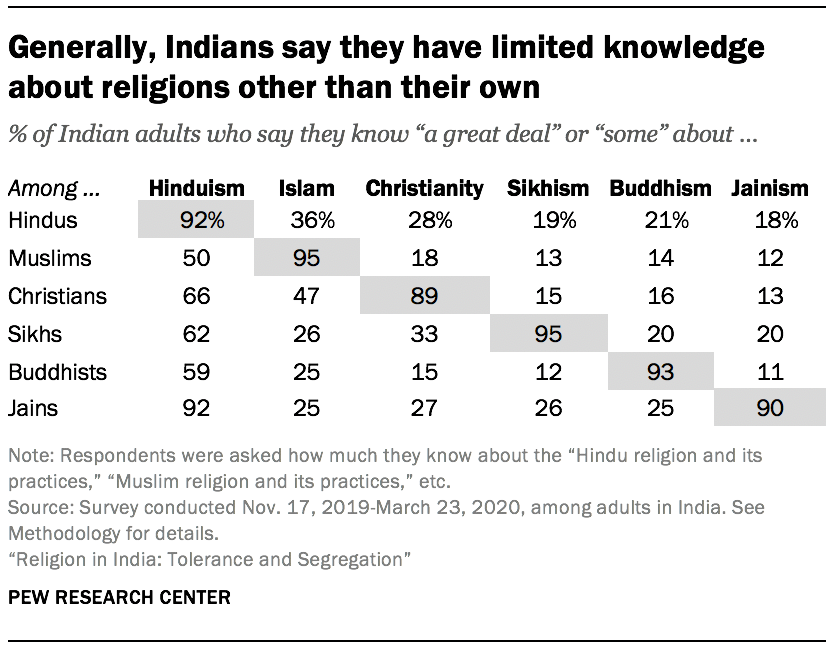
Most Indians say they know a lot about their own religion. And very high shares in each religious group say they know at least some about their own faith. For example, 92% of Hindus say they know “a great deal” or “some” about the Hindu religion and its practices, and nearly all Sikhs (95%) say the same about Sikhism.
Considerably fewer people say they know a great deal – or even some – about other religions. For example, roughly a third of India’s Hindus (36%) say they know at least something about Islam, and even fewer say they know something about Christianity (28%). About one-in-five Hindus say they have at least some knowledge about Buddhism (21%), Sikhism (19%) or Jainism (18%), despite theological similarities between Hinduism and these three religions. Most Hindus say they know “not very much” or “nothing at all” about each of the other faiths.
Of course, the vast majority of Indians are Hindu, and it stands to reason that non-Hindus living in India would have at least some knowledge about Hinduism. Half of Muslims and most Jains (92%), Christians (66%), Sikhs (62%) and Buddhists (59%) say they know at least something about the Hindu religion and its practices.
Yet Christians, Sikhs, Jains, Buddhists and Muslims generally know less about one another’s religions. For example, just 26% of Sikhs say they know at least “some” about Islam, and only 13% of Muslims say they know something about the Sikh religion and its practices.
One exception is how much Christians know about Islam. Nearly half of Christians (47%) say they know either a lot or some about Islam. Far fewer Muslims (18%) say the same about Christianity.
More Muslims in the South of the country than elsewhere say they know about other religions. For example, about half of Muslims in the South (53%) say they have at least some knowledge of Christianity, compared with 18% of Muslims nationally. And a large majority of Southern Muslims (76%) say they know at least something about Hinduism, including (27%) who say they know a lot about the country’s majority religion. By comparison, half of Muslims nationally indicate they know at least something about Hinduism, and just 9% say they know a lot about the religion.
Among Hindus, those who are college educated are more likely to claim at least some knowledge about other religions. Hindus who live in the North of India are more likely than Hindus overall to say they know at least something about Sikhism (44% vs. 19% nationally), perhaps because many Sikhs are concentrated in the Northern state of Punjab. And Hindus from the South are much more likely than those elsewhere to say they have some knowledge of Islam (54% vs. 36% nationally) and Christianity (56% vs. 28% nationally).
Indians lean toward seeing truth in many religions
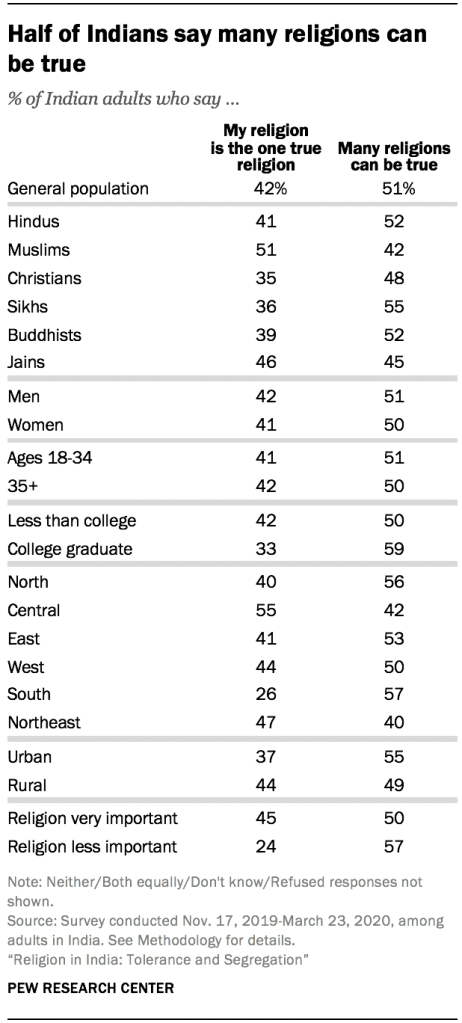
When asked which statement comes closest to their opinion – “My religion is the one true religion” or “Many religions can be true” – a sizable minority (42%) say theirs is the one true religion, while somewhat more (51%) take the view that many religions can be true.10
The predominant view among Hindus, Christians, Sikhs and Buddhists is that there are many true religions. Muslims have the largest share who take the position that theirs is the one true religion (51%). Jains are about evenly divided on this question.
Gender and age make little difference in whether people believe their religion is the only true one. There is, however, a link between education and views on this question: College-educated Indians are more likely than others to say many religions can be true (59% vs. 50%). Also, people living in urban areas of the country are slightly more inclined to take this position than rural Indians (55% vs. 49%).
Generally, Indians who are more religiously observant are much more likely to take the view that theirs is the one true religion. Among Indians who say religion is very important in their lives, 45% say only their religion is true, compared with a quarter (24%) of Indians who say religion is less important in their lives. This pattern holds among both Hindus and Muslims; for example, 53% of Muslims who say religion is very important in their lives see Islam as the one true religion, compared with 35% among those who consider religion less important.
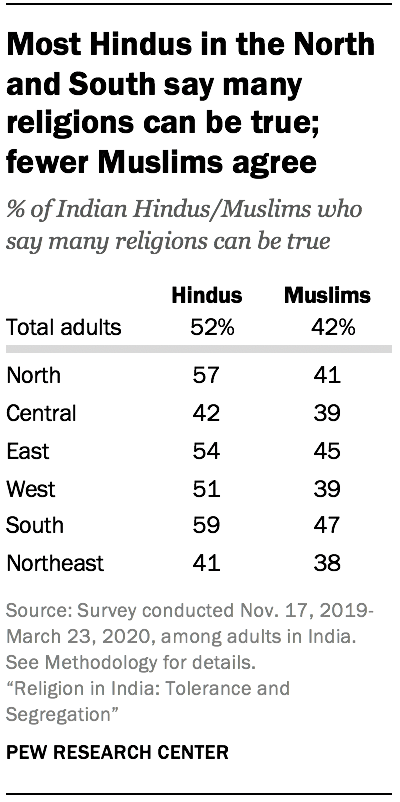
There are some partisan differences among Hindus on this question: Those who have a favorable view of the BJP are more likely than other Hindus to say Hinduism is the one true religion (45% vs. 32%).
Regionally, majorities of Indian adults in the North, East and South say many religions can be true. By contrast, those in the Central region are generally more likely to say their religion is the one true faith (55%).
Among Hindus in the North, a majority (57%) say many religions can be true. But among Northern Muslims, about the same share take the opposite view: 58% say Islam is the one true religion.
Substantial shares of Buddhists, Sikhs say they have worshipped at religious venues other than their own
In an effort to understand whether Indians of various religious backgrounds mix religious practices, the survey asked people if they have ever prayed, meditated or performed a ritual in a house of worship other than the one associated with their own religion. For example, Sikhs were asked if they have ever prayed, meditated or performed a ritual at a mosque, church, Hindu temple, Buddhist stupa or Sufi shrine. (For more discussion of religious beliefs and practices that many Indians have in common, see Chapter 7 and Chapter 11.)
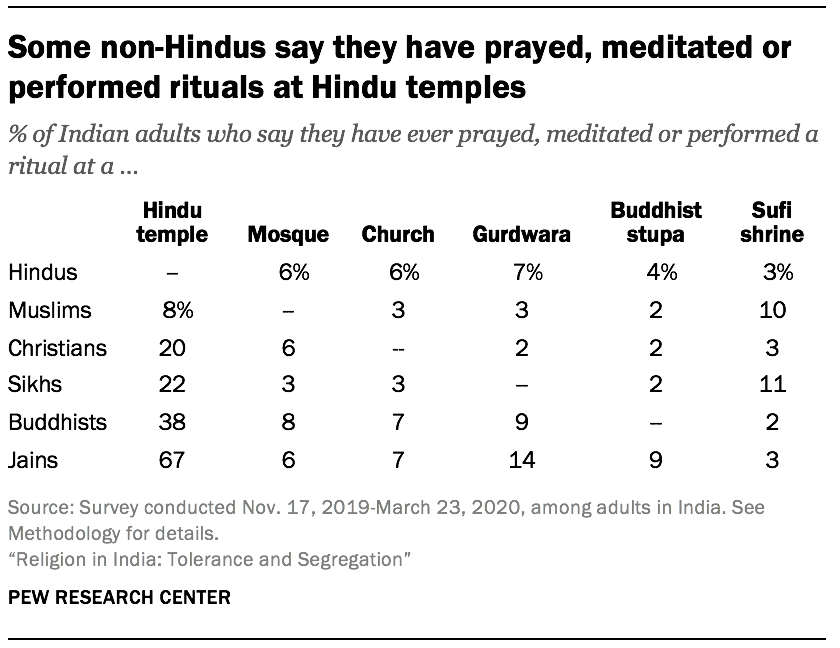
The vast majority of Indians say they have not worshipped in religious sites belonging to other religions. But some have done so, especially in Hindu temples. For example, 38% of Buddhists say they have worshipped at a Hindu temple, as have about one-in-five Sikhs (22%) and Christians (20%). By comparison, fewer Muslims (8%) report having done so.
The distinction between Hindu and Jain temples is often ambiguous, so it stands to reason that a majority of Jains (67%) say they have worshipped at a Hindu temple. Some Jains (14%) also have prayed at a Sikh gurdwara.
About one-in-ten Sikhs (11%) and Muslims (10%) say they have prayed, meditated or performed a ritual at a Sufi shrine; Sufism tends to be most closely associated with a particular interpretation of Islam, although people of many faiths in India identify with Sufism (see Chapter 5 for details).
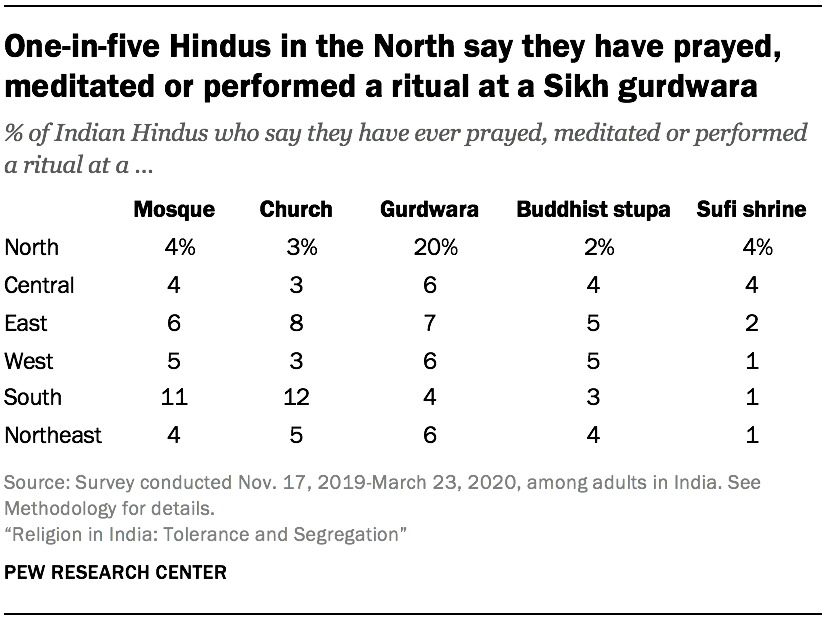
Relatively small shares of Hindus say they have worshipped at sites associated with other faiths. But there is some regional variation in the shares of Hindus who have worshipped at non-Hindu venues. Most strikingly, in the North, fully one-in-five Hindus say they have worshipped at a gurdwara. Indian Sikhs are concentrated in the North, in the state of Punjab, which also is the home of the famous gurdwara known as the Golden Temple.
In the South, where many of India’s Christians are concentrated, about one-in-ten Hindus (12%) say they have prayed at a church, and roughly the same share (11%) say they have performed a ritual at a mosque.
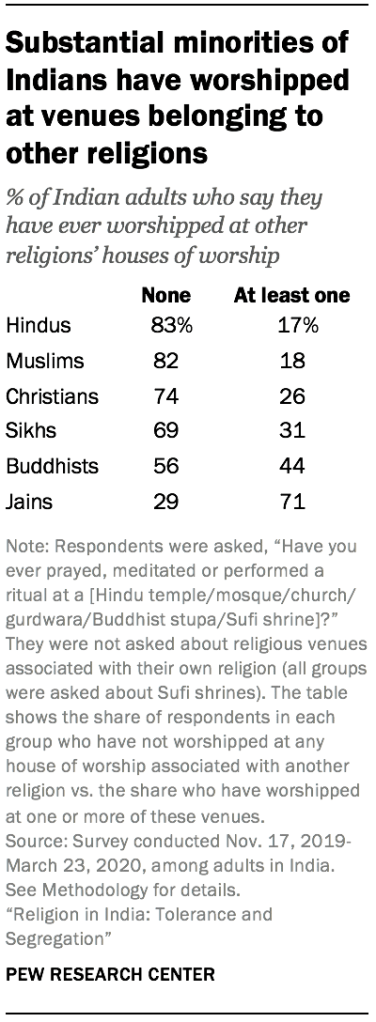
However, substantial minorities say they have worshipped at one or more venues belonging to another religion. For example, nearly one-in-five Hindus (17%) say they have prayed, meditated or performed a ritual at one or more of the five non-Hindu types of houses of worship asked about in the survey. Among Sikhs, 31% say they have worshipped at a church, mosque, Hindu temple, Sufi shrine or Buddhist stupa (or at more than one of these places). And among Buddhists, more than four-in-ten (44%) report having such an experience.
Among Muslims, 18% say they have prayed at a house of worship other than a mosque, including those who have worshipped at a Sufi shrine. (Sufi shrines are most closely associated with Islam, though there is also anti-Sufi sentiment among some Muslims in parts of the world.) Excluding Sufi shrines, one-in-ten Muslims in India have worshipped at a church, Hindu temple, Sikh gurdwara or Buddhist stupa.
Overall, men and college-educated Indians are slightly more likely to say they have prayed, meditated or performed a ritual at one or more venues associated with another religion. For example, 10% of college-educated Hindus have prayed at a church, compared with 6% of those who have less education.
One-in-five Muslims in India participate in celebrations of Diwali
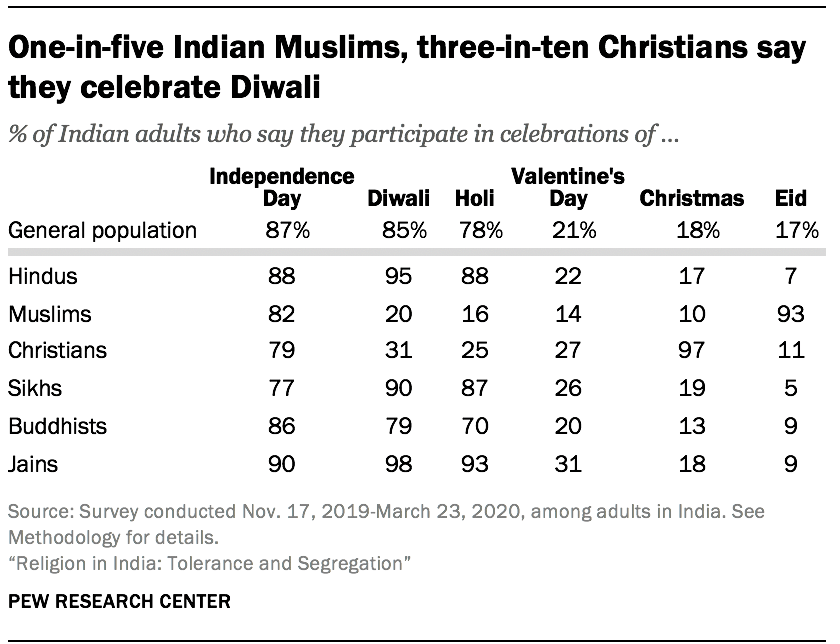
Indians celebrate myriad festivals and national holidays, each with its own rituals and traditions. The survey asked Indians of all religious backgrounds whether they participate in celebrating one national holiday (Independence Day), a few religious festivals associated with various groups (Diwali, Holi, Christmas and Eid), and the Western holiday of Valentine’s Day, which recently has gained some popularity in India.
As expected, most people celebrate festivals associated with their own religious tradition. Near-universal shares of Hindus (95%), Sikhs (90%) and Jains (98%) say they celebrate Diwali, as do about eight-in-ten Buddhists (79%). Muslims overwhelmingly say they participate in celebrations of Eid (93%), and virtually all Christians (97%) celebrate Christmas. In addition, the vast majority of Indians (87%), regardless of their religious background, commemorate the day India declared its independence from British rule, celebrated on Aug. 15.
But many Indians also celebrate festivals that are not traditionally associated with their respective religions. For example, substantial shares of Muslims (20%) and Christians (31%) in India say they participate in Diwali celebrations. Also, notable shares of both those religious communities (16% of Muslims and 25% of Christians) say they participate in celebrating Holi, the spring festival of color that is observed by most Hindus, Sikhs, Buddhists and Jains.
Fewer Hindus (and other non-Muslims) celebrate the Muslim holiday of Eid. Among Hindus, 7% say they participate in celebrations of Eid, as do 11% of Christians. But celebrations of Christmas are relatively popular among non-Christians in India: Nearly one-in-five Hindus, Sikhs and Jains say they participate in Christmas festivities.
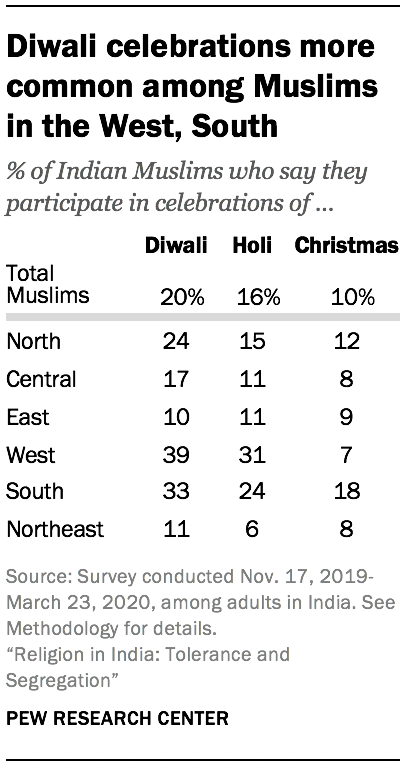
Hindus who are less religious are more likely to say they participate in celebrations of Christmas. These celebrations also are more common among Hindus in the South and among Hindus with a college education. For example, 23% of Hindus in the South say they celebrate Christmas, compared with about half as many in the Northeast (11%), even though both regions have a strong Christian presence. Christmas also is more commonly celebrated by urban than rural Hindus (23% vs. 14%).
Muslims vary regionally when it comes to celebrating Diwali and Holi. Among Muslims in the North, nearly a quarter (24%) say they celebrate Diwali, and 15% participate in Holi festivities. In Western India, even larger shares of Muslims say they participate in Diwali (39%) and Holi (31%) celebrations.

Moreover, fully one-in-five Indian adults (21%) say they celebrate Valentine’s Day. Though it is historically associated with Western Christianity, Indian Christians celebrate Valentine’s Day (27%) at about the same rate that they celebrate Diwali (31%) or Holi (25%). Christians also are about as likely as Sikhs (26%) to celebrate Valentine’s Day.
Nationally, marking Valentine’s Day tends to be more popular among young adults (35% among those ages 18 to 25), those who have a college education (40%) and those who live in urban areas (27%). It also is more commonly celebrated by people who do not consider religion very important in their lives (27%, vs. 20% among those who see religion as very important).
Even though some Hindu groups have criticized Valentine’s Day as foreign to Indian culture and inappropriate for a socially conservative society, participation in the holiday is not politically divided. People who have a favorable opinion of the ruling party are no less likely than those who have an unfavorable view of the BJP to say they celebrate Valentine’s Day (21% and 20%, respectively).




